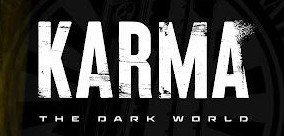

English version
Hello, dear friends of @hivegc. I think we're living in a somewhat strange time in fiction, in which two factors have greatly influenced storytellers. The first comes from that perspective in which the real mixes with the surreal. The logical thing to think of would be David Lynch, but I think his influence reaches as far as modern weird fantasy, in works like Severance. The second has less to do with sources and more with the times we live in, in which there is no longer any novel art and, on the contrary, all entertainment media compete in an unstoppable avalanche of content. This sometimes forces us to fall into pretense. To excessively attract attention. To the point where the content matters more than the container. And, unfortunately, I think that's what has happened with Karma: The Dark World.

It's incredibly difficult to explain what this game is because it wants to be everything. A psychological thriller mixed with a dystopian future that isn't content with being like 1984, which also tries to introduce notions of Brave New World. But, again, Karma believes this isn't enough, so it adds an extra layer with a detective plot full of surreal moments, with little investigation and lots of fireworks. And that's the problem: nothing I see in Karma feels completely its own, but rather borrowed from others. The best way I can explain it is with The Red Room.
As I said, Karma really likes surrealism. It's a mix of walking simulator with some interactive moments and small puzzles, and above all, it seeks to fill each level with strange moments. That wouldn't be a problem, but the thing about surrealism is that you have to be really good so that the player/viewer never completely disconnects. Surrealism should emphasize the dark sides of the mind, but there must also be light.



But I was talking about The Red Room. That's the name of that legendary place in Twin Peaks where Agent Cooper connects with Laura Palmer and strange characters like the Man from Another Place and the Giant. While this mythical room serves a perfect narrative function for Lynch's series, Karma has the audacity to use it for an entire level. With its red curtains and zigzag floor. It's not a reference, a small nod; it's an entire level that makes you think influence trumps substance.


Karma's story is difficult to describe. You begin by waking up in a strange place—though the entire game is just as strange—with wires attached to your arm. After passing through a few rooms, you meet a man who doesn't explain anything to you, because you don't remember who you are, but you agree to sit in a chair and explore your memories. This is when this kind of dystopian uchronia truly begins, in which we are a special investigative agent, tasked with investigating a robbery perpetrated by a worker. But, as we do so, the strange remains more present than the ordinary.
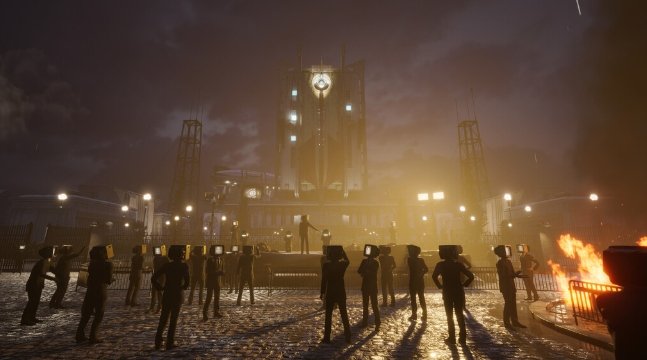
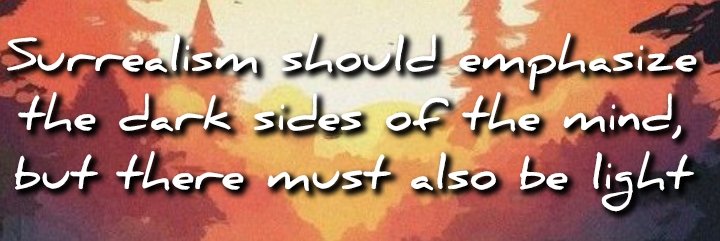

I've had a hard time connecting with Karma for these reasons. In the moments when it slows down, it's able to create good levels with freedom of exploration, decently crafted little puzzles, and a sense of trust in the player. But I've often felt like its developers were completely terrified of the player getting bored, and they've filled everything with awkward moments simply to grab your attention, without them actually meaning anything.
Along the way, almost everything we do is explore. The best moments, as I said, are when the game takes a break from that roller coaster of surrealism to let the mystery unfold through puzzles, reviewing notes, and guessing a few passwords. Nothing truly inspired, but it at least allows for greater player freedom. The rest of the scenes, however, are well-recreated artistically, which is clearly the main motivation of their creators. They also don't hold back when it comes to showing some characters on screen, something that isn't so common in walking simulators and is appreciated.
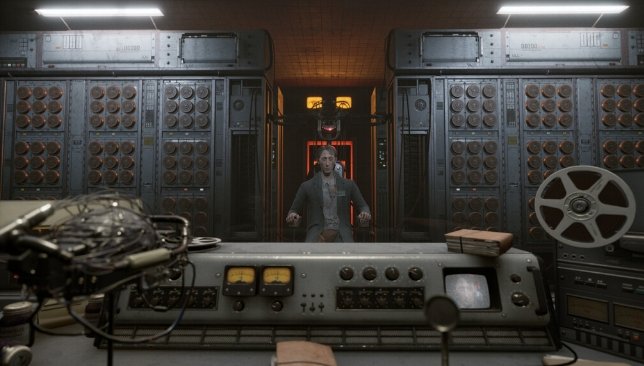

Yes, little by little, some things begin to make sense in this story, but I have to admit that, by then, I'm a bit fatigued by the experience. What a walking simulator compresses into a 2-3 hour, paced experience, Karma wants to extend to 8-10 hours on your first playthrough. And while some answers may be coherent, there's a lot of this bizarre experience that ends up feeling too gratuitous, with the excuse of delving into the minds of individuals in this society.
And don't get me wrong, there are few things I enjoy more than a well-made surreal thriller. I adore Twin Peaks and, in general, the entire work of the sadly deceased Lynch. I shudder thinking about each of the shocking magical realist scenes in What Remains of Edith Finch. I even liked Aronofsky's Mother! , so as not to resort to Black Swan. But when I play Karma, I don't see any intention of reinforcing a story with surreal elements. I simply see a call for attention, perhaps desperate, to stand out in a sea of video games.
I think there's a certain modern obsession with the surreal, and the avalanche of content these days pushes this tendency toward exaggeration. Karma: The Dark World falls into both traps. It wants to be everything: a psychological and dreamlike thriller, a futuristic dystopia, a detective noir... but ultimately manages to make nothing feel authentic. I think its biggest flaw is its lack of subtlety. It takes iconic elements like the Red Room from Twin Peaks and uses them without grace or purpose. The surrealism here is only meant to shock, but I don't think so much to delve deeper. Furthermore, the plot is a monumental mess of amnesia, authoritarianism, mental exploration, investigations, and strange moments that drown the narrative. There are flashes of quality in the exploration and puzzles at times, but they're lost in a sea of contrivance. Personally, I enjoy good surrealism, mind you, but sometimes Karma just seems desperate for attention. And, after 8-10 bloated hours, while there are answers, there's also a lot of fatigue. There is style, but less substance.
Thank you very much for getting here.

• Images are taken from the game
• Translated by Google Translate

Versión en español
Hola queridos amigos de @hivegc .Creo que vivimos en un momento un tanto extraño de la ficción, en el que hay dos factores que han influenciado mucho a los contadores de historias. El primero viene dado por esa vertiente en la que lo real se mezcla con lo surreal. Lo lógico sería pensar en David Lynch, pero creo que su influencia alcanza hasta la weird fantasy moderna, en obras como Severance. La segunda tiene que ver menos con las fuentes y más con los tiempos que nos ha tocado vivir, en el que ya no hay arte novedoso y, por el contrario, todos los medios de entretenimiento compiten en una avalancha de contenido imparable. Esto a veces obliga a caer en la pretensión. A llamar en exceso la atención. A que el contenido importe más que el continente. Y, lamentablemente, creo que es lo que le ha pasado a este Karma: The Dark World.

Es dificilísimo explicar lo que es este juego porque lo quiere ser todo. Un thriller psicológico mezclado con un futuro distópico que no le vale con ser como 1984, que también quiere meter nociones de Un Mundo Feliz. Pero, de nuevo, Karma cree que esto no es suficiente, así que le añade una capa extra con una trama detectivesca llena de momentos surrealistas en la que se investiga poco y se rellena de mucho fuego de artificio. Y ese es el problema, que nada de lo que veo en Karma me parece suyo completamente, sino prestado de otros. La mejor forma que tengo de explicarlo es con La Habitación Roja.
Como digo, a Karma le gusta mucho el surrealismo. Es una mezcla de walking simulator con algunos momentos de interacción y pequeños puzles que, sobre todo, busca rellenar cada nivel de momentos extraños. No habría problema, pero lo que pasa con el surrealismo es que tienes que ser verdaderamente bueno para que el jugador/espectador nunca se desconecte del todo. El surrealismo debe enfatizar los lados oscuros de la mente, pero también debe haber luz.
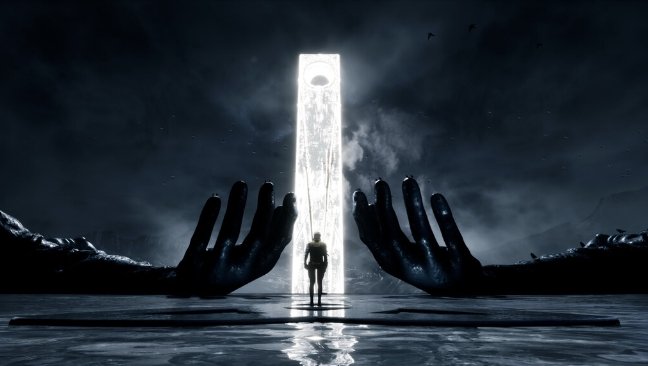


Pero hablaba de La Habitación Roja. Así es como se llama ese mítico lugar de Twin Peaks donde el agente Cooper conecta con Laura Palmer y con extraños personajes como el Hombre de Otro Lugar o el Gigante. Si bien esta mítica habitación cumple una función narrativa perfecta para la serie de Lynch, Karma tiene la osadía de usarla para todo un nivel. Con sus cortinas rojas y su suelo en zigzag. No es una referencia, un pequeño guiño, es un nivel completo que te hace pensar que la influencia está por encima de la esencia.
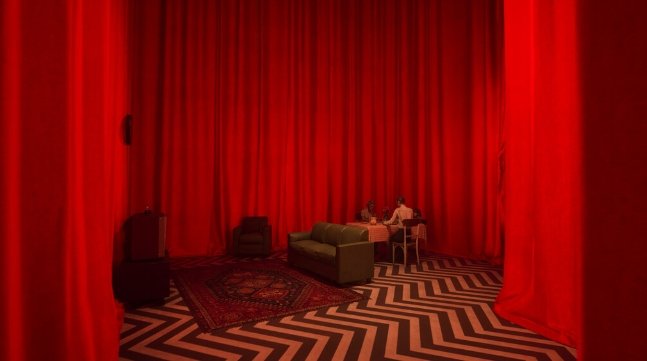

La historia de Karma es difícil de describir. Comienzas despertándote en un lugar extraño, aunque todo el juego es igual de extraño, con unos cables en el brazo. Tras pasar unas habitaciones conoces a un hombre que no te explica nada, porque tú no recuerdas quién eres, pero accedes a sentarte en una silla y explorar tus recuerdos. Es cuando realmente comienza esta especie de ucronía distópica en la que somos un agente especial de investigación, encargado de investigar el robo perpetrado por un trabajador. Pero, mientras lo hacemos, lo extraño sigue teniendo más presencia que lo ordinario.
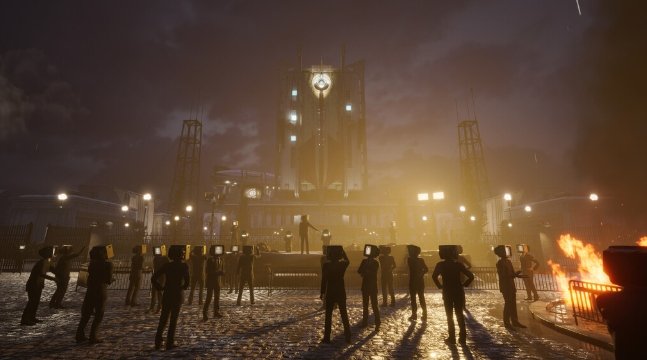


Me ha costado mucho conectar con Karma por estas razones. En los momentos en los que se tranquiliza, es capaz de formar buenos niveles con libertad de exploración, pequeños puzles elaborados con decencia y confiando en el jugador. Pero a menudo he tenido la sensación de que sus desarrolladores estaban completamente aterrados de que el jugador se aburriera, y han llenado todo de momentos extraños por el sencillo motivo de atraer tu atención, sin que signifiquen nada en realidad.
En el camino, casi todo lo que hacemos es explorar. Los mejores momentos, como decía, son los que el juego se toma un respiro de esa montaña rusa de surrealismo para dejar que el misterio se desenvuelva por medio de los puzles, revisando notas y adivinando algunas contraseñas. Nada realmente inspirado, pero que al menos permite una mayor libertad del jugador. El resto de escenas, eso sí, están bien recreadas en lo artístico, que se nota que es la principal motivación de sus autores, además de no privarse a la hora de mostrar algunos personajes en pantalla, algo que no es tan común en el walking simulator y se agradece.
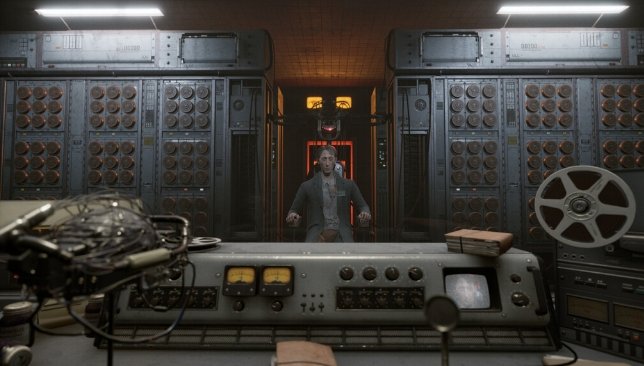

Sí, poco a poco algunas cosas comienzan a tener sentido en esta historia, pero tengo que admitir que, para entonces, he llegado un tanto fatigado de la experiencia. Lo que en un walking simulator comprime en una experiencia de 2-3 horas con ritmo, Karma lo quiere extender a las 8-10 horas de duración en tu primera partida. Y aunque algunas respuestas puedan ser coherentes, hay mucho de esa experiencia estrambótica que termina resultando demasiado gratuita, con la excusa de rebuscar en las mentes de los individuos de esta sociedad.
Y no me malinterpretéis, pocas cosas disfruto más que de un thriller surrealista bien hecho. Adoro Twin Peaks y en general toda la obra del tristemente fallecido Lynch. Me estremezco pensando en cada una de las escenas impactantes del realismo mágico de What Remains of Edith Finch. Hasta me gustó Madre! de Aronofsky, por no recurrir a Cisne Negro. Pero cuando juego a Karma no veo esa intención de reforzar una historia con elementos surrealistas. Simplemente veo una llamada de atención, quizá desesperada, por destacar en un mar de videojuegos.
Creo que hay una cierta obsesión moderna por lo surrealista y la avalancha de contenido de nuestros días encima empuja esta tendencia a la exageración. Karma: The Dark World cae en ambas trampas. Quiere ser de todo: thriller psicológico y onírico, distopía futurista, detective noir... pero al final logra que nada parezca auténtico. Creo que su mayor defecto es la falta de sutileza. Toma elementos icónicos como la Habitación Roja de Twin Peaks y los usa sin gracia ni propósito. El surrealismo aquí solo busca impactar, pero creo que no tanto profundizar. Además, la trama es un lío monumental de amnesia, autoritarismo, exploración mental, investigaciones y momentos extraños que ahogan la narrativa. Hay destellos de calidad en la exploración y los puzles a veces, pero se pierden en un mar de artificios. Personalmente disfruto del buen surrealismo, ojo, pero a veces Karma solo parece desesperado por llamar la atención. Y, tras 8-10 horas infladas, aunque hay respuestas, también hay mucha fatiga. Hay estilo, pero menos sustancia.
Muchas gracias x yegar hasta aqui

• las imágenes son sacadas del juego
• traducido por el traductor de google

